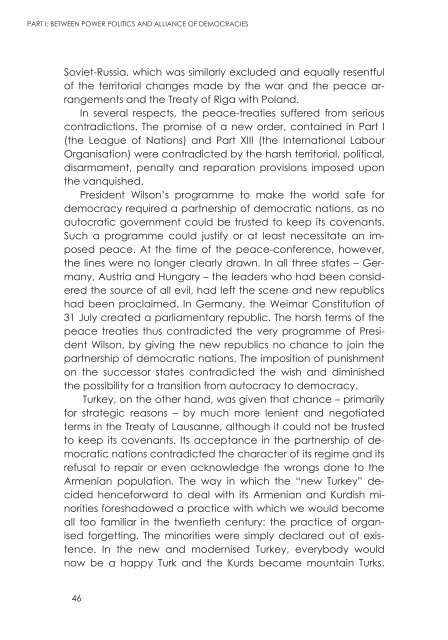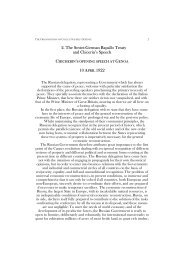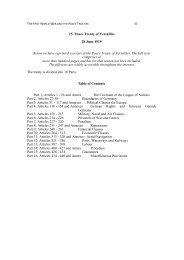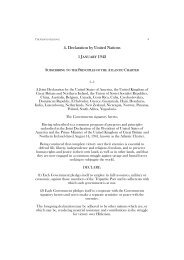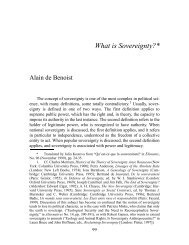CHAPTER 1 THE FIRST WORLD WAR AND THE PEACE TREATIES
CHAPTER 1 THE FIRST WORLD WAR AND THE PEACE TREATIES
CHAPTER 1 THE FIRST WORLD WAR AND THE PEACE TREATIES
You also want an ePaper? Increase the reach of your titles
YUMPU automatically turns print PDFs into web optimized ePapers that Google loves.
PART I: BETWEEN POWER POLITICS <strong>AND</strong> ALLIANCE OF DEMOCRACIES<br />
Soviet-Russia, which was similarly excluded and equally resentful<br />
of the territorial changes made by the war and the peace arrangements<br />
and the Treaty of Riga with Poland.<br />
In several respects, the peace-treaties suffered from serious<br />
contradictions. The promise of a new order, contained in Part I<br />
(the League of Nations) and Part XIII (the International Labour<br />
Organisation) were contradicted by the harsh territorial, political,<br />
disarmament, penalty and reparation provisions imposed upon<br />
the vanquished.<br />
President Wilson’s programme to make the world safe for<br />
democracy required a partnership of democratic nations, as no<br />
autocratic government could be trusted to keep its covenants.<br />
Such a programme could justify or at least necessitate an imposed<br />
peace. At the time of the peace-conference, however,<br />
the lines were no longer clearly drawn. In all three states – Germany,<br />
Austria and Hungary – the leaders who had been considered<br />
the source of all evil, had left the scene and new republics<br />
had been proclaimed. In Germany, the Weimar Constitution of<br />
31 July created a parliamentary republic. The harsh terms of the<br />
peace treaties thus contradicted the very programme of President<br />
Wilson, by giving the new republics no chance to join the<br />
partnership of democratic nations. The imposition of punishment<br />
on the successor states contradicted the wish and diminished<br />
the possibility for a transition from autocracy to democracy.<br />
Turkey, on the other hand, was given that chance – primarily<br />
for strategic reasons – by much more lenient and negotiated<br />
terms in the Treaty of Lausanne, although it could not be trusted<br />
to keep its covenants. Its acceptance in the partnership of democratic<br />
nations contradicted the character of its regime and its<br />
refusal to repair or even acknowledge the wrongs done to the<br />
Armenian population. The way in which the “new Turkey” decided<br />
henceforward to deal with its Armenian and Kurdish minorities<br />
foreshadowed a practice with which we would become<br />
all too familiar in the twentieth century: the practice of organised<br />
forgetting. The minorities were simply declared out of existence.<br />
In the new and modernised Turkey, everybody would<br />
now be a happy Turk and the Kurds became mountain Turks.<br />
46


